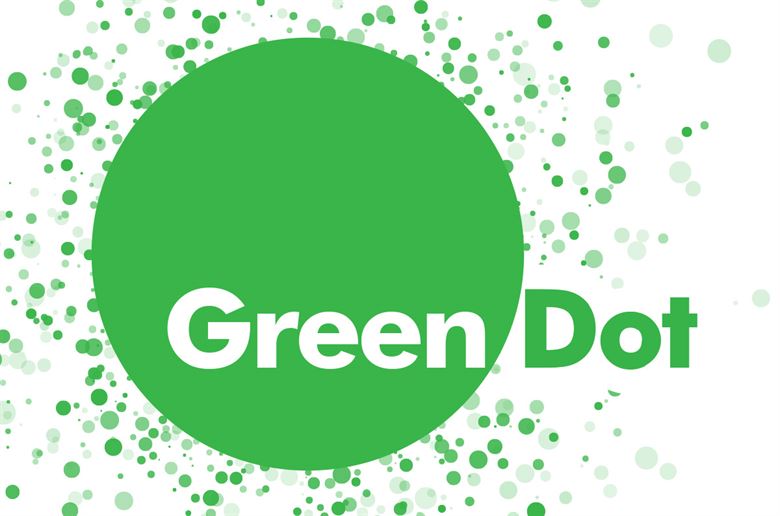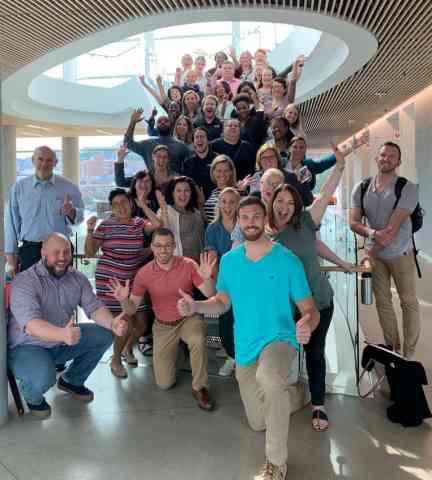
Here's a cute picture of a moose that is comically close to the camera because we all need it right now:

Image Description: a brown moose taken at very close range. Photograph courtesy of Malte Wingen on Unsplash
Okay, now onto the data! In this week's installment of Tartan Datascapes, I want to talk about survey data. Have you ever received a follow-up survey after you've gone to a workshop or an event? Be honest - do you fill it out? If your answer to the second question is no, I'm not here to shame you (promise!), but I am here to show you how those surveys can be very useful data sources for the people who sent them to you!
A few months ago, I was fortunate to be able to attend Green Dot training at CMU, led by Noah Riley (he/him/his), Health Promotion Specialist with University Health Services, and Jesse Koch, Associate Director of SLICE (Student Leadership, Involvement, and Civic Engagement) and Housefellow. Green Dot is a national, evidence-based program that aims to reduce sexual assaults through cultural change. The program treats members of the campus community as allies against assault, and trains them to be active bystanders who know how to intervene in concerning situations. Below is an excerpt from Alteristic, the organization which created the Green Dot program:
Traditional prevention programs may only approach men as potential perpetrators and women as potential victims. Green Dot approaches all students, staff, administrators, and faculty as allies. The original Green Dot program was conceived in the college setting to prevent dating violence, sexual violence, and stalking. It relies on the premise that if everyone does their small part and commits to individual responsibility, the combined effect is a safe campus culture that is intolerant of violence. The college-based curriculum draws heavily on the experiences of college students and the reality of this issue in their lives. This curriculum uses interactive activities to reinforce core concepts and encourages students to envision their future and the world in which they want to live, then aligns their bystander behavior with that vision.
The training I attended here on campus, which was attended by both faculty and staff, was hands-on and involved individual and group discussion exercises. I left feeling more educated on how I could, as faculty, help actively support an environment of safety for all members of our campus community. As the training ended, we were encouraged to fill out a survey relating to our experiences in the training and suggestions for future sessions, which, as a good data steward, I made sure to fill out! As a RDM Consultant, I often look at the many ways that data exists around me, and then I start to think about how it might be managed (hey, I've never tried to hide my love of managing data!). This prompted me to reach out to Noah Riley, who I had met through his work with the TINA (Trans, Intersex, & Nonbinary Advocacy) group on campus. I was incredibly lucky for the opportunity to sit down with Noah and learn more about the history of this program, and the fascinating ways that data informs the training.
CMU, in partnership with the Pittsburgh Council on Higher Education, hosted a Green Dot facilitator training in 2017, which included participants from many local institutions including Chatham University, University of Pittsburgh, Point Park University, Duquesne University, Robert Morris University, and the Community College of Allegheny County. I'm so grateful this facilitator training happened, because it meant I was able to take this wonderful training!
While I took the hour-long training, I learned from Noah that there are also longer Green Dot trainings available at CMU where data are not only collected in surveys, but there are additional data points from live polls, where participants use their phones or laptops to answer a question, and anonymized results are shown on the screen in the training room. All of these data points help ensure the local training curriculum is effective for the needs of the CMU community!
Surveys can be an effective way to gather data (in the form of feedback) from workshops, events, and training, and CMU's Green Dot program relies on survey data to understand the effectiveness of the curriculum. What happens with these surveys? You can rest assured that your responses to these surveys are incredibly valuable to Noah and Jesse, and help to directly inform future iterations of the training at CMU. The data are securely stored in spreadsheets and coded in a way that allows the organizers to effectively chart trends and outliers in the data - which means they can quickly see which parts of the training are effective, and if the data suggest there are areas of opportunity where the training can be improved. And, in an act of excellent data management, these codes are included in a codebook with the data! What is a codebook? Think of a codebook as a FAQ (frequently asked questions) for your data - they describe and define any variables, how the data are formatted, and how they are structured in the dataset. While I recommend making these for all datasets you work with, it's incredibly important to have a codebook when you are collaborating with data, as Noah and Jesse do with Green Dot data!
One of the goals for Green Dot training at CMU was to have at least one Green Dot training facilitator in every college, which would create a campus-wide opportunity to build a culture which does not tolerate power-based personal violence. I'm proud to share that this goal was achieved through a facilitator training held in the summer of 2019, although there is no longer a facilitator in the Mellon College of Science (interested? Please send me an email (information below) and I can put you in touch with Noah and Jesse!). The achievement of this goal means there is a great opportunity to gather diverse survey data from the training sessions, continually working to craft the training curriculum in a way that best serves our CMU community!

Image Description: Attendees from the 2019 Green Dot facilitator training are smiling into the camera with their thumbs-up
In the research data management world, we love the idea of learning through (properly and ethically) shared data. I was thrilled to hear that one of the future goals in this program is to share data from Green Dot training with other institutions in the Pittsburgh area, such as Chatham University and Duquesne University, to see the impact of evidence-based training.
What are three takeaways from this highlight?
1. It's incredibly important to fill out the follow-up surveys you receive after attending workshops, webinars, events, courses, etc. These surveys provide crucial data for those who are facilitating these events, and can ensure that your voice, as a participant, is heard!
2. Especially when working with data collaboratively (although it's a good practice for solo researchers, too!), be sure that any codes used in your data are documented in a codebook that is readily available to all those working with the data. Noah and Jesse have access to the data from Green Dot training surveys, as well as a codebook for understanding how the data are organized. This is an excellent example of research data management in action! Are you feeling overwhelmed at the prospect of making a codebook? That's why I am here! I completely understand how this can be overwhelming and this is a completely valid feeling, and I'm here to help. Just send me an email at hgunderm@andrew.cmu.edu!
3. Green Dot training at CMU is incredibly informative and can help you learn how to be an active bystander against power-based personal violence on our campus. I found it to be a very empowering experience, and I highly recommend taking it in the future!
Follow this link for information on our response to COVID-19: https://www.library.cmu.edu/node/2106. While the remainder of our Spring 2020 workshops are either cancelled or will take place online (follow this link for more information on our events: https://cmu.libcal.com/calendar/events/?cid=-1&t=m&d=0000-00-00&cal=-1), there's still a lot of great ways to engage with CMU Libraries virtually. You can check out our LibGuides, specialized research guides created by our subject experts, by clicking here, including the Data 101 guide found here. We also have a variety of online databases and resources at your disposal, found here. Looking for some more specialized support? dSHARP and the Data Collaborations Office Hours are now virtual until further notice! Click here for more information on joining us Wednesdays from 1-4pm.
And of course, please email me at hgunderm@andrew.cmu.edu if you'd like some help on your journey as a researcher/scholar/awesome human being here at CMU. Remember, we all use data, regardless of our discipline. If you think something might be data, you are likely correct and I can help you develop good habits for managing it! If you'd like to have your research data featured on Tartan Datascapes, please fill out the Google Form at this link to get in touch: https://forms.gle/iwEDbwmaNYmpMa7aA!
